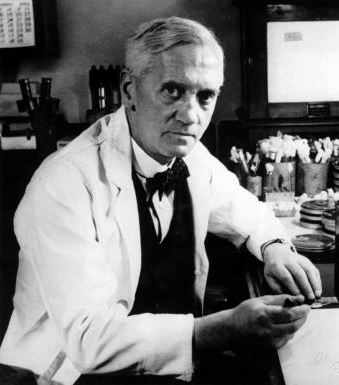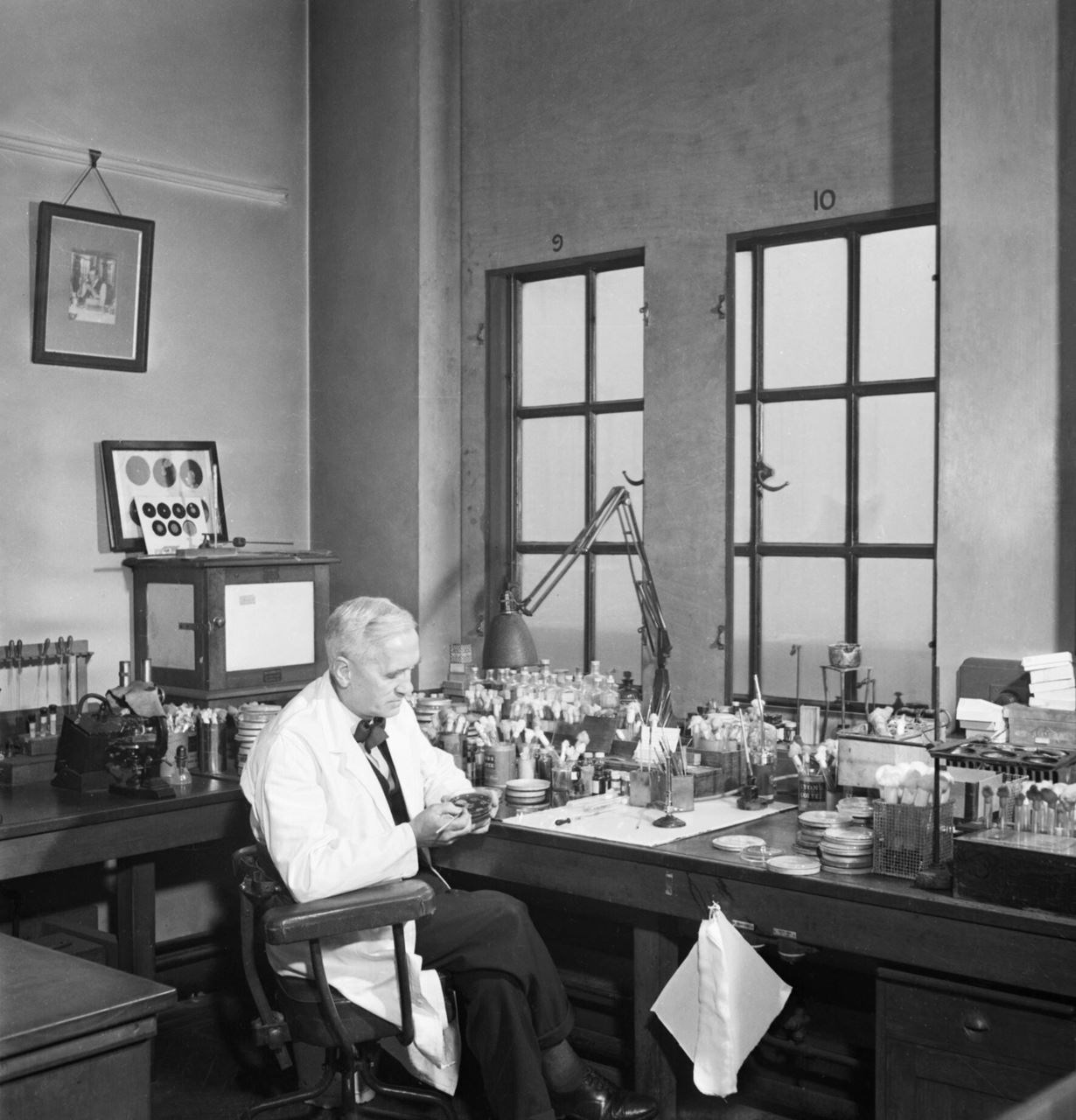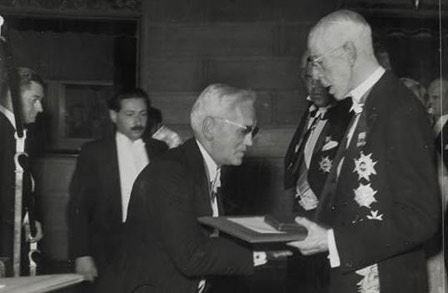 Alexander FlemingUnknown author [public domain] via WikimediaDavid Granger explains in his article, “Boy, Do We Ever Need a Hero” that “Heroes arrive when we need them most. They define us and point us in a direction” (Granger). He indicates that people call upon heroes to lead them down a positive path. It is also important to understand what characteristics a hero should have, so that we progress forward instead of backward. One characteristic of a true hero is that he is someone who uses what he has to help other people. This can be a man with great strength fighting for his country in the military, an intelligent person working to discover something that could save lives, or even a wealthy man who donates all of his money to charity. Another characteristic that I believe is needed in a hero is compassion for other humans. A hero must be able to understand the suffering of other people, with his main goal being to change the world for the better. Since a hero’s primary objective is to change the world, a hero must be able to use his innate abilities to help others while also having compassion for other people.
Alexander FlemingUnknown author [public domain] via WikimediaDavid Granger explains in his article, “Boy, Do We Ever Need a Hero” that “Heroes arrive when we need them most. They define us and point us in a direction” (Granger). He indicates that people call upon heroes to lead them down a positive path. It is also important to understand what characteristics a hero should have, so that we progress forward instead of backward. One characteristic of a true hero is that he is someone who uses what he has to help other people. This can be a man with great strength fighting for his country in the military, an intelligent person working to discover something that could save lives, or even a wealthy man who donates all of his money to charity. Another characteristic that I believe is needed in a hero is compassion for other humans. A hero must be able to understand the suffering of other people, with his main goal being to change the world for the better. Since a hero’s primary objective is to change the world, a hero must be able to use his innate abilities to help others while also having compassion for other people.
An example of a hero who uses his skills to help other people and has compassion for humans is Alexander Fleming, a bacteriologist whose caring for others lead him to discover penicillin, an antibiotic that has saved millions of lives. Fleming was born on August 6, 1881 in Lochfield, Scotland and began his medical career in 1901, when he entered St. Mary’s Hospital Medical School. After graduating in 1906, he started working there with his mentor, Sir Almroth Edward Wright. Fleming and Wright both joined the Royal Army Medical Corps during World War I, where they were able to prove why antiseptics should not be used to treat infections. After the war, Fleming focused his attention on looking for better antibiotics to treat people (World Of Scientific Discovery). In 1922, he discovered lysozyme, an antibacterial compound. Then, in 1928, he did what he is most known for: he discovered penicillin. However, he “was unable to purify and concentrate the substance” (World Of Scientific Discovery). That is, until 1940, when bacteriologists Howard Florey and Ernst Chain “were able to purify penicillin and test it on humans with outstanding results” (World Of Scientific Discovery). The antibiotic was used on soldiers in World War II and it saved thousands of lives (World Of Scientific Discovery). After this, Fleming received many awards. In 1945, he shared the Nobel Prize in Physiology or Medicine with Howard Florey and Ernst Chain. Fleming was able to discover penicillin because of his quick thinking to examine the mold instead of throwing it away. Even after receiving fame for what he had done, he still tried to help people. Fleming is well-deserving of the title hero because he utilized his intelligence to save lives and was motivated by his compassion to benefit others and change the world for the better; furthermore, he has inspired scientists to be persistent and collaborate to achieve a common goal.
 Fleming working in his labUnknown author [public domain] via WikipediaFleming used his insight and intellect to draw a conclusion that has helped generations of people, making him a hero. An example of this is his discovery of penicillin. In 1928, Fleming made one of the most significant breakthroughs in medical history. He noticed that a mold growing in his petri dishes prevented bacteria from developing. Instead of discarding the mold, he decided to look further into it: “He preserved the mold--a strain of Penicillium--and made a culture of it in a test tube for further investigation” (World Of Scientific Discovery). Alexander Fleming made the decision to keep the mold, as he knew that it could lead to a significant discovery. His insight makes him a hero because it allowed him to unearth an antibiotic that has saved millions of lives to this day by efficiently treating infections. If Fleming had decided to just throw away the mold, he would have never made the heroic discovery he did and the millions of people saved by penicillin may not have survived their potentially deadly infections. Because of his decision to not discard the mold, Fleming was able to ascertain that the mold could be used to kill bacteria: "He identified that it belonged to the Penicillium genus and that it produced a bacteria-killing liquid. On March 7, 1929 he formally named the antibiotic penicillin. Fleming published his results, showing that penicillin killed many different species of bacteria, including those responsible for scarlet fever, pneumonia, meningitis, and diphtheria. Furthermore, penicillin was non-toxic and it did not attack white blood cells" (Famous Scientists). Because of his intellect, he logically concluded that the mold could fight infections by destroying bacteria. He was also able to ensure that it would be safe for humans to use by determining that penicillin would not attack a human’s cells. By using his best judgement to make one of the most substantial revelations in medical history, Alexander Fleming demonstrated why he is a true hero. Most people, if seeing a mold developing on an object, would just discard it without a second thought. Fleming, however, investigated the mold and discovered a way to use it to benefit society, thus making him a hero.
Fleming working in his labUnknown author [public domain] via WikipediaFleming used his insight and intellect to draw a conclusion that has helped generations of people, making him a hero. An example of this is his discovery of penicillin. In 1928, Fleming made one of the most significant breakthroughs in medical history. He noticed that a mold growing in his petri dishes prevented bacteria from developing. Instead of discarding the mold, he decided to look further into it: “He preserved the mold--a strain of Penicillium--and made a culture of it in a test tube for further investigation” (World Of Scientific Discovery). Alexander Fleming made the decision to keep the mold, as he knew that it could lead to a significant discovery. His insight makes him a hero because it allowed him to unearth an antibiotic that has saved millions of lives to this day by efficiently treating infections. If Fleming had decided to just throw away the mold, he would have never made the heroic discovery he did and the millions of people saved by penicillin may not have survived their potentially deadly infections. Because of his decision to not discard the mold, Fleming was able to ascertain that the mold could be used to kill bacteria: "He identified that it belonged to the Penicillium genus and that it produced a bacteria-killing liquid. On March 7, 1929 he formally named the antibiotic penicillin. Fleming published his results, showing that penicillin killed many different species of bacteria, including those responsible for scarlet fever, pneumonia, meningitis, and diphtheria. Furthermore, penicillin was non-toxic and it did not attack white blood cells" (Famous Scientists). Because of his intellect, he logically concluded that the mold could fight infections by destroying bacteria. He was also able to ensure that it would be safe for humans to use by determining that penicillin would not attack a human’s cells. By using his best judgement to make one of the most substantial revelations in medical history, Alexander Fleming demonstrated why he is a true hero. Most people, if seeing a mold developing on an object, would just discard it without a second thought. Fleming, however, investigated the mold and discovered a way to use it to benefit society, thus making him a hero.
Additionally, Alexander Fleming’s compassion for others drove him to find more efficient ways to help people. Before he discovered penicillin, Fleming worked in the Royal Army Medical Corps during World War I with Almroth Wright as medics who studied wounds and infection-causing bacteria. Fleming saw the pain of countless soldiers who were injured and not receiving proper treatment for deep wounds, “but most army doctors refused to change their ways, resulting in many preventable deaths” (Famous Scientists). However, Fleming and Wright realized that a saline solution would be much more effective in treating deep wounds than antiseptics, the most accepted treatment at the time. Despite most doctors being resistant to changing their ways, Fleming still used the saline solution on his patients over antiseptics: “Fleming saved many soldiers’ lives in World War One by washing deep wounds with saline solution rather than the antiseptics recommended by medical textbooks” (Famous Scientists). These wounded soldiers were in pain, and most doctors were using something that didn’t help them heal at all. Fleming, on the other hand, wanted to alleviate that pain, even though his reputation as a medic could be damaged. A true hero is someone who prioritizes other people over himself, which is exactly what Alexander Fleming did. In addition, Fleming’s selflessness can be seen in his tours; one specific instance was when “In 1945 he toured America, where chemical companies offered him a personal gift of $100,000 as a mark of respect and gratitude for his work. Typically [sic] of Fleming, he did not accept the gift for himself: he donated it to the research laboratories at St Mary’s Hospital Medical School” (Famous Scientists). Fleming’s donation enabled the medical school to seek more antibiotics in addition to penicillin. He could have taken the money for himself, but he knew that there were people in pain and he wanted to help them. Even after gaining fame for what he had done, his compassion lead him to continue to search for even more ways to help people with painful infections. Alexander Fleming’s compassion and his unchanging goal to help others who are hurting makes him a true hero.
 Alexander Fleming receiving the Nobel Prize in 1945Unknown author [public domain] via WikimediaAlexander Fleming is a true hero because he helped change the world for the better with his intelligence and was driven by his compassion to save people. He had the insight to preserve the mold based on what he noticed, and the intellect to confirm it was an antibacterial substance. Likewise, Fleming was compassionate, and even after gaining fame for what he had done, he still strived to help others in any possible way he could. He also is an inspiration for scientists around the world. Despite discovering penicillin, Fleming was unable to isolate it or produce it in high concentrations. Rather than give up on his discovery hastily, he continued to work with it for years: “Regardless of these issues, Fleming continued with some work on penicillin in the 1930s…” (Famous Scientists). Alexander Fleming could have resigned from his efforts easily, but he did not. His actions inspire aspiring scientists to persist when faced with challenges. Moreover, when Fleming spoke his Banquet Speech after winning the Nobel Prize, he reflected on what he thought about working with others: “...teamwork may inhibit the primary initiation of something quite new but once a clue has been obtained teamwork may be absolutely necessary to bring the discovery to full advantage” (Fleming qtd Banquet Speech). Here, Alexander Fleming referred to Howard Florey and Ernst Chain, who were able to purify penicillin and test it on humans. He noted that he could not have made this breakthrough on his own. Through his words, he demonstrates to scientists that while they may be able to make the first step in a world-changing discovery, they must work with fellow scientists to achieve an ultimate goal. And as an aspiring scientist myself, I have been inspired by Fleming both as a scientist and as a person. He has inspired me to take up Chemistry, a more advanced science class. Additionally, Fleming has helped me realize that if I really want to change the world, I will not be able to do it alone. I will need to work with other people who share my goals. Furthermore, I often feel overwhelmed by daily life with school, extracurriculars, and other responsibilities. But when I feel like giving up, and when I feel like there is no reason to keep trying, I remember how Fleming did not stop at his greatest achievement, and I keep going. Fleming is an inspirational figure to scientists everywhere because he persisted with his mission and supported collaboration in the scientific community. Fleming inspires scientists to work together to achieve something that changes the world and points them in the right direction, inspiring them to persist even when intimidating challenges stand in their path.
Alexander Fleming receiving the Nobel Prize in 1945Unknown author [public domain] via WikimediaAlexander Fleming is a true hero because he helped change the world for the better with his intelligence and was driven by his compassion to save people. He had the insight to preserve the mold based on what he noticed, and the intellect to confirm it was an antibacterial substance. Likewise, Fleming was compassionate, and even after gaining fame for what he had done, he still strived to help others in any possible way he could. He also is an inspiration for scientists around the world. Despite discovering penicillin, Fleming was unable to isolate it or produce it in high concentrations. Rather than give up on his discovery hastily, he continued to work with it for years: “Regardless of these issues, Fleming continued with some work on penicillin in the 1930s…” (Famous Scientists). Alexander Fleming could have resigned from his efforts easily, but he did not. His actions inspire aspiring scientists to persist when faced with challenges. Moreover, when Fleming spoke his Banquet Speech after winning the Nobel Prize, he reflected on what he thought about working with others: “...teamwork may inhibit the primary initiation of something quite new but once a clue has been obtained teamwork may be absolutely necessary to bring the discovery to full advantage” (Fleming qtd Banquet Speech). Here, Alexander Fleming referred to Howard Florey and Ernst Chain, who were able to purify penicillin and test it on humans. He noted that he could not have made this breakthrough on his own. Through his words, he demonstrates to scientists that while they may be able to make the first step in a world-changing discovery, they must work with fellow scientists to achieve an ultimate goal. And as an aspiring scientist myself, I have been inspired by Fleming both as a scientist and as a person. He has inspired me to take up Chemistry, a more advanced science class. Additionally, Fleming has helped me realize that if I really want to change the world, I will not be able to do it alone. I will need to work with other people who share my goals. Furthermore, I often feel overwhelmed by daily life with school, extracurriculars, and other responsibilities. But when I feel like giving up, and when I feel like there is no reason to keep trying, I remember how Fleming did not stop at his greatest achievement, and I keep going. Fleming is an inspirational figure to scientists everywhere because he persisted with his mission and supported collaboration in the scientific community. Fleming inspires scientists to work together to achieve something that changes the world and points them in the right direction, inspiring them to persist even when intimidating challenges stand in their path.
Page created on 2/12/2019 2:13:43 AM
Last edited 8/3/2024 10:30:12 PM
"Alexander Fleming." Famous Scientists. famousscientists.org. 09 Jul. 2015. Web. Accessed 1 Jan 2019.
"Alexander Fleming." World of Scientific Discovery, Gale, a Cengage Company, 2006. Student Resources In Context, Accessed 25 Dec. 2018.
Granger, David. “Boy, Do We Ever Need a Hero.” Esquire, vol. 130, no. 5, Nov. 1998, p. 26.
Sir Alexander Fleming – Banquet speech. NobelPrize.org. Nobel Media AB 2019. Tue. 15 Jan 2019.
